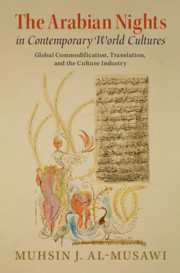 The Arabian Nights in Contemporary World Cultures
The Arabian Nights in Contemporary World Cultures Published online by Cambridge University Press: 17 August 2021
Chapter 3 discusses other sides of narrative properties, taking as examples and models a number of writers from Bethlehem to Havana, to demonstrate two sides of engagement with the Nights: its role in consolidating predispositions to the art of narrative, as in the case of the Palestinian-Iraqi novelist, critic, poet, and painter Jabra Ibrahim Jabra, and also its generous loans to writers across the globe. A narrative globe-trotter of a sort, Scheherazade of the Nights is an ever welcome guest and host in almost every culture. If she gives the French novelist Michel Butor a second mendicant of multiple adventures and transformations that converse with his experimentation in new fiction, it is Proust’s self-reference for an unfinished narrative journey. Barth reads its frame tale as a dialectic between sex and narrative. The Egyptian Nobel Prize winner Najīb Maḥfūẓ presents the cosmopolitan female narrator as an adept who cannot dispense, however, with her Sufi master’s guidance to see behind the thick material barriers of arrogance, passion, vicissitudes, wide challenges, and the need to combat evil. Scheherazade is the trope for the confabulator nocturni.
To save this book to your Kindle, first ensure no-reply@cambridge.org is added to your Approved Personal Document E-mail List under your Personal Document Settings on the Manage Your Content and Devices page of your Amazon account. Then enter the ‘name’ part of your Kindle email address below. Find out more about saving to your Kindle.
Note you can select to save to either the @free.kindle.com or @kindle.com variations. ‘@free.kindle.com’ emails are free but can only be saved to your device when it is connected to wi-fi. ‘@kindle.com’ emails can be delivered even when you are not connected to wi-fi, but note that service fees apply.
Find out more about the Kindle Personal Document Service.
To save content items to your account, please confirm that you agree to abide by our usage policies. If this is the first time you use this feature, you will be asked to authorise Cambridge Core to connect with your account. Find out more about saving content to Dropbox.
To save content items to your account, please confirm that you agree to abide by our usage policies. If this is the first time you use this feature, you will be asked to authorise Cambridge Core to connect with your account. Find out more about saving content to Google Drive.